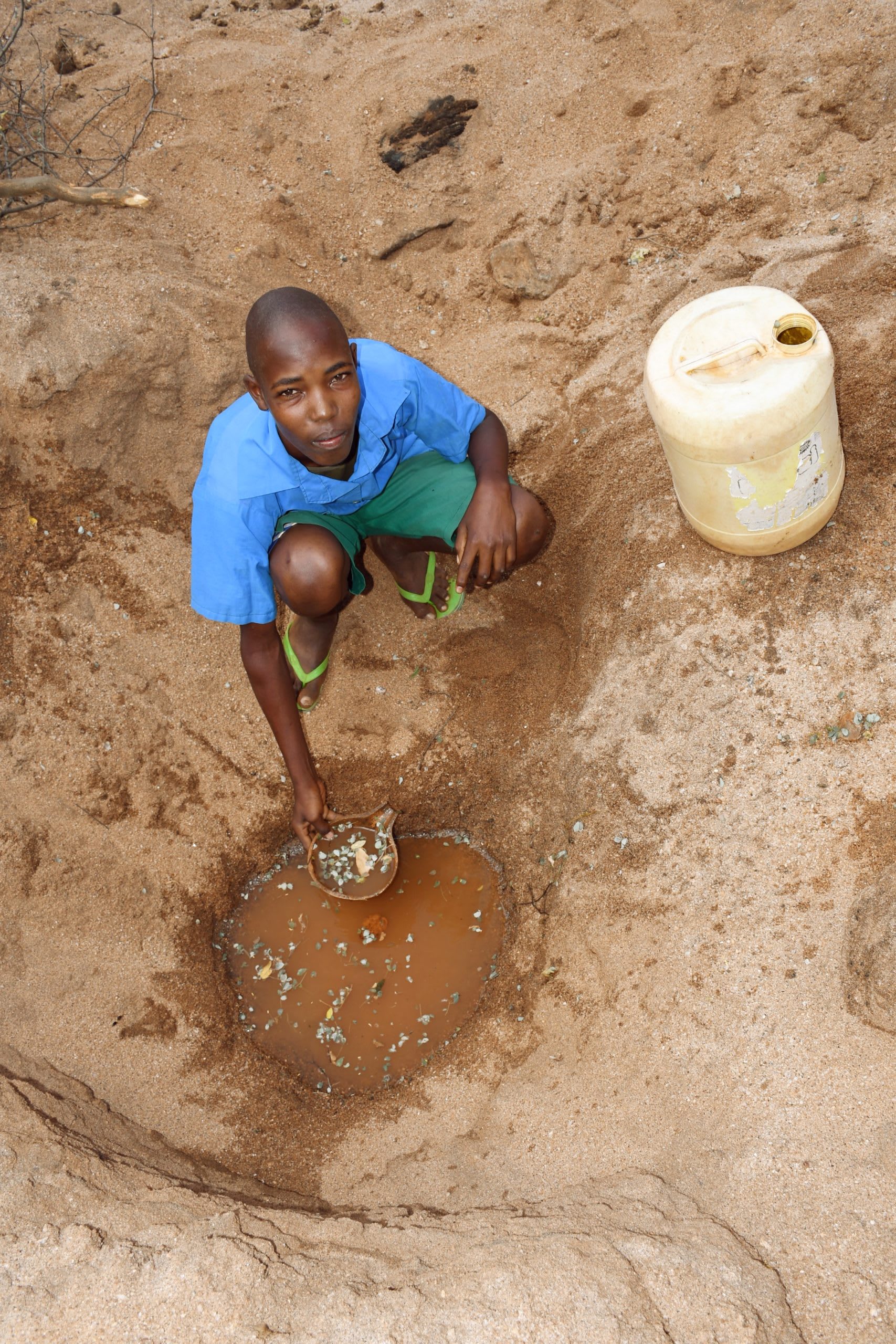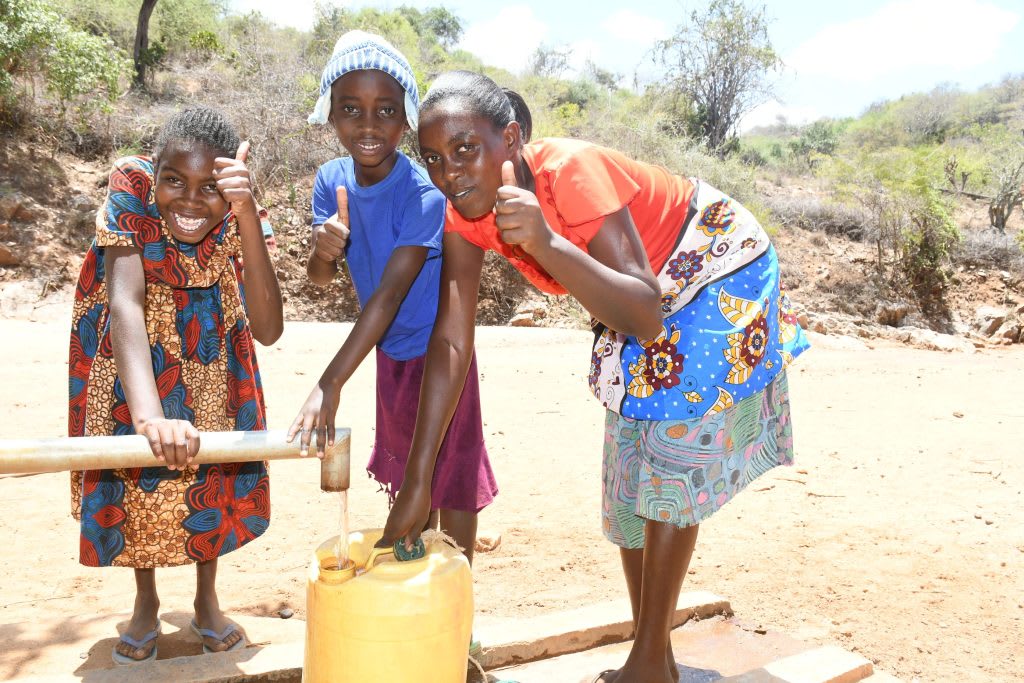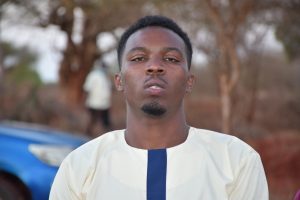The 440 community members of Kalamba face an incredibly frustrating challenge. Many people walk over three miles to collect water from a scoop hole (seen below), but there isn't enough, and what they do find is unsafe to consume.

Kalama community as a whole is drained from the water crisis they face. Most adults are farmers, so any time not spent on their trade is taking away their income. Families already struggle to have enough resources to meet their needs, often going without crucial medical care because it's too expensive. Moreover, medical care is often needed because the scoop hole they collect water from is contaminated by animal waste and many other contaminants.
Forty-five-year-old farmer Alice Maithya, seen below carrying water, shared her thoughts about the water crisis in her community. "Water from the scoop hole is contaminated, and me and my children often contract typhoid, amoeba, and various stomach upsets. One of my grandchildren has not gone to school for a couple of days now because of stomach upsets, and I can only get local herbs because taking her to a dispensary is expensive, and I did not reap much from the last harvest."

"We also lack enough water for drinking, and we have to remain thirsty [on] several occasions," she continued.
Field Officer Alex Koech said, "The main sources of water in the area have a low quantity of water, [are] located several kilometers away and [are] contaminated. The low quantity of water from the water points has led to quarrels between community members because everyone wants to finish up and concentrate on other affairs. Sometimes, the donkeys (the main form of water transportation) become stubborn and refuse to carry the load because of exhaustion."

Alex continued, "The scoop holes are open to contamination from the community members and their livestock. This exposes the residents to infections such as typhoid, amoeba, dysentery, diarrhea, and more."
Adults struggle to meet their families' needs. In comparison, children have to sacrifice integral learning time to contribute to collecting water.
Sixteen-year-old Kimanzi M., seen below collecting water, vocalized how the water crisis affects him. "Getting water to drink is difficult because I have to walk several kilometers searching for water, which consumes most of my time. Sometimes, taking a bath is difficult because water is scarce. I am also required to carry water to school each morning, meaning I need to fetch water in the evening after classes, which is very exhausting and has affected my performance level in school."

Helping to solve the water crisis in this community will take a multi-faceted system. It requires the collaboration of the hand-dug well and a sand dam. They will work together to create a sustainable water source that will serve this community for years to come.
"When the project [is] installed, I will no longer walk several kilometers searching for water, and I will get more time to study or play with my friends. I will also have enough water to perform personal hygiene and sanitation," Kimanzi remarked.
"When the proposed water point [is] installed, my children and I will have enough clean water to drink, and we will no longer [be] exposed to infections such as typhoid, amoeba, and dysentery," Alice concluded.
Giving the Kalamba Community access to safe water closer to home will give them the tools to dream of a better future.
Note: Our proposed water point can only serve 300 people per day. We hope to continue working with this community to identify other water solutions that will ensure all of the people in this community have access to safe and reliable drinking water.
The Proposed Solution, Determined Together...
At The Water Project, everyone has a part in conversations and solutions. We operate in transparency, believing it benefits everyone. We expect reliability from one another as well as our water solutions. Everyone involved makes this possible through hard work and dedication.
In a joint discovery process, community members determine their most advantageous water solution alongside our technical experts. Read more specifics about this solution on the What We're Building tab of this project page. Then, community members lend their support by collecting needed construction materials (sometimes for months ahead of time!), providing labor alongside our artisans, sheltering and feeding the builders, and supplying additional resources.
Water Access for Everyone
This water project is one piece in a large puzzle. In Kenya, Sierra Leone, and Uganda, we're working toward complete coverage of reliable, maintained water sources that guarantee public access now and in the future within a 30-minute round trip for each community, household, school, and health center. One day, we hope to report that this has been achieved!
Training on Health, Hygiene & More
With the community's input, we've identified topics where training will increase positive health outcomes at personal, household, and community levels. We'll coordinate with them to find the best training date. Some examples of what we train communities on are:
- Improved hygiene, health, and sanitation habits
- Safe water handling, storage & treatment
- Disease prevention and proper handwashing
- Income-generation
- Community leadership, governance, & election of a water committee
- Operation and maintenance of the water point





 Protected Dug Well
Protected Dug Well
 Rehabilitation Project
Rehabilitation Project




























